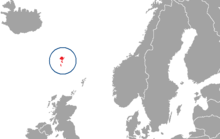The politics of the Faroe Islands, an autonomous country of the Kingdom of Denmark, function within the framework of a parliamentary, representative democratic dependency, whereby the Prime Minister of the Faroe Islands is the head of government, and of a multi-party system. The Faroe Islands are politically associated with the Kingdom of Denmark but have been self-governing since 1948. Executive power is exercised by the government. Legislative power is vested in both the government and the Løgting. The judiciary is independent of the executive and the legislature and the responsibility of Denmark.

The Løgting is the unicameral parliament of the Faroe Islands, an autonomous territory within the Danish Realm.
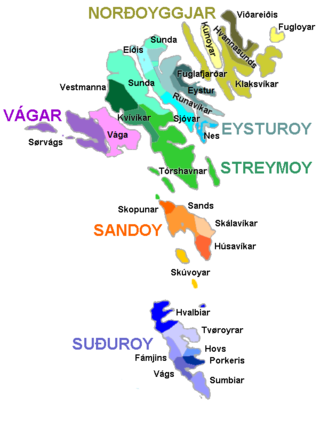
The Faroe Islands are divided into 29 municipalities, six regions/shires and since 2007 there has been only one constituency, earlier there were seven constituencies. Each region has one sheriff.
Same-sex marriage has been legal in Denmark since 15 June 2012. A bill for the legalization of same-sex marriages was introduced by the Thorning-Schmidt I Cabinet, and approved by the Folketing on 7 June 2012. It received royal assent by Queen Margrethe II on 12 June and took effect three days later. Denmark was the eleventh country in the world and the eighth in Europe to legalize same-sex marriage. It was the first country in the world to enact registered partnerships, which provided same-sex couples with almost all of the rights and benefits of marriage, in 1989.

The British occupation of the Faroe Islands during World War II, also known as Operation Valentine, was implemented immediately following the German invasion of Denmark and Norway. It was a small component of the roles of Nordic countries in World War II.

The following outline is provided as an overview of and topical guide to the Faroe Islands:
Same-sex marriage has been legal in the Faroe Islands since 1 July 2017. Legislation allowing same-sex marriage and adoption by same-sex couples was approved by the Løgting on 29 April 2016. The Danish Parliament approved the necessary legislative adaptations on 25 April 2017, and the law received royal assent on 3 May and went into effect on 1 July 2017.

The Faroe or Faeroe Islands, or simply the Faroes, are an archipelago in the North Atlantic Ocean and an autonomous territory of the Kingdom of Denmark. The official language of the country is Faroese, which is closely related to and partially mutually intelligible with Icelandic.

Kaj Leo Holm Johannesen is a Faroese politician. He was the prime minister of the Faroe Islands, representing the Faroese Unionist Party (Sambandsflokkurin). He took office, succeeding Jóannes Eidesgaard on 26 September 2008 and left office on 15 September 2015, after his party and coalition with Fólkaflokkurin and Miðflokkurin lost the general election on 1 September 2015. Johannesen is also a former international football player; he was goalkeeper for the Faroe Islands national football team.

Høgni Reistrup is a Faroese singer, musician, writer and scientist from Tórshavn, Faroe Islands. He is the co-writer of the book Exit Føroyar ; he wrote it together with Heri á Rógvi. The books was published in 2012 and created a major debate in the Faroe Islands and in Denmark about the problems the Faroe Islands were facing with population decline in the islands, where the biggest problems seemed to be that half of the young people who moved away to study abroad never moved back again; especially the women did not move back again. After a period of six years with negative net migration in the Faroe Islands, the country saw an increase in the population in 2014 and 2015.
The Tour of Faroe Islands is a road cycling race held in the Faroe Islands. The race consists of a men's, women's and juniors' competition over a prologue and four or five stages, which are for elite cyclists and shorter distances for non-elite cyclists. From 2011 to 2013, the race was changed to four stages in three days. The first edition of the Kring Føroyar tour was held in 1996 but it was not an official race; the 1997 Tour was the first official edition of the race. The race is normally held in July shortly before Ólavsøka. In 2012 the race was held from 20 July to 22 July. The last day of the race is held in Tórshavn, and the roads are closed for traffic on that day. In 2015 the race will be held from 22–26 July. For sponsor reasons the name of the tour was Statoil Kring Føroyar, and later when the Faroese company changed its name from Statoil to Effo, the tour was called Effo Kring Føroyar. In 2014 the race got a new main sponsor and the name was changed to Volvo Kring Føroyar. As of 2015, the length of the race is 430 kilometres (270 mi) for elite cyclists and 230 kilometres (140 mi) for youth and senior cyclists.

Progress is a liberal, pro-Faroese independence political party on the Faroe Islands.
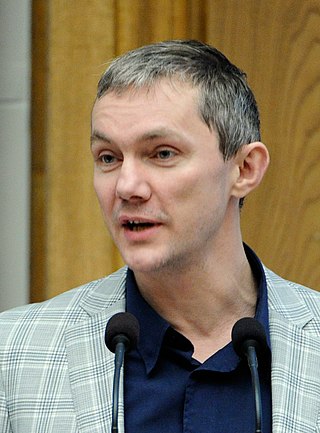
Sjúrður Skaale is a Faroese politician, journalist, skydiver, belly dancer, and comedian. He is a member of the Folketing for the Social Democratic Party. From 2008 to 2011 he was a member of the Løgting.

Jenis Kristian av Rana is a Faroese medical practitioner and politician, serving as leader of the Centre Party since 2001. He served as minister of Foreign Affairs and Culture of the Faroe Islands from 2019 until his party's withdrawal from government in November 2022.

Bárður á Steig Nielsen is a Faroese politician and businessman who serves as leader of the Union Party since 2015 and was prime minister from 2019 to 2022. He is also goalkeeper of the VÍF Vestmanna handball team and a former handball player of the Faroe Islands national team.

Bjørt Samuelsen is a Faroese journalist, master in food science and politician (Republic).
Sonja J. Jógvansdóttir is a Faroese journalist, politician, and establisher and coordinator of Samtak, the Faroese trade union center. Until 2015, she was a member of Social Democratic Party (Javnaðarflokkurin). She is a spokesperson for the rights of homosexual people and their rights in the Faroe Islands and was one of the establishers of LGBT Faroe Islands in 2011.

Hanna Jensen is a Faroese high school teacher and a liberal politician (Progress).
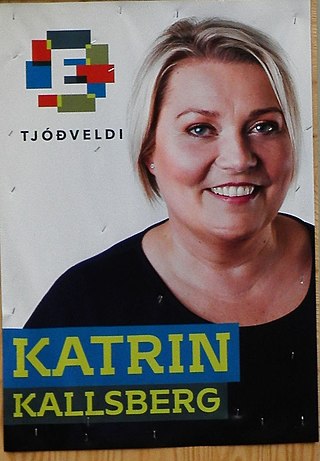
Katrin Kallsberg is a Faroese gynaecologist and politician Republic (Tjóðveldi).
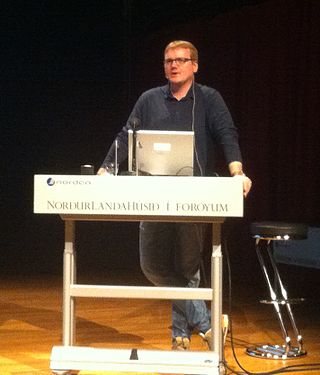
LGBT Føroyar is a political lobbying organization for lesbian, gay, bisexual and transgender (LGBT) people in the Faroe Islands.
